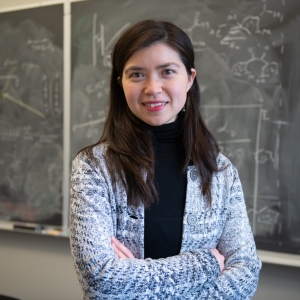ANNA WUTTIG HONORED WITH NSF CAREER AWARD

Assistant Professor of Chemistry Anna Wuttig has received a NSF CAREER Award from the National Science Foundation. The award supports junior faculty in the sciences through the Faculty Early Career Development Program. The highly regarded honor is bestowed annually upon researchers who have demonstrated exceptional promise in their respective fields. For Wuttig, it carries with it a five-year grant to support the project within the Chemical Catalysis Program of the Chemistry Division.
“We're excited to build on our initial findings,” said Wuttig, “where you can use non-covalent interactions to modify the interface of an electrode, which has a lot of implications for how we think about the design of complex electrified interfaces where all electrochemical reactions occur.”
Electrocatalysts and A Renewable Future
Electrochemistry plays a vital role in the quest for a renewable future, particularly through the development of electrocatalysts. These catalysts enable the storage of intermittent renewable sources of energy, such as solar and wind, and the conversion of chemical energy of fuels to electricity. Researchers like Wuttig work to optimize these energy conversion and storage processes central to an economy free of CO2 emissions.
Indeed, Wuttig is emphatic when discussing electrochemistry's role in a renewable future: “It’s such an amazing field and it has a large relevance in thinking about moving towards a society where we can decarbonize our chemical industry and energy sources. All those components require electricity to drive chemical reactions, which is electrochemistry.”
The Challenge of Defining Electrified Interfaces
One of the primary goals for Wuttig’s research is to find the molecular definition of complex electrified interfaces. Unlike other synthetic chemistries where researchers can imagine a molecule and then create it in the lab, the dynamic nature of the electrified interface poses unique difficulties. Each interface changes with the applied potential, thus making it challenging to envision and create specific structures. However, an initial study published in August by Wuttig’s lab lays the groundwork for a foundation for approaching this goal.
It's a goal that requires a highly interdisciplinary approach and expertise in materials, interfacial, and molecular science. As Wuttig explains, “…they may seem like disparate fields, but to me it's all the same, because at the core of that, we need to advance the fundamental science that underlies electrified interfaces regardless of your target chemistry.”
Educational Goals at UChicago
In addition to research goals, the NSF CAREER Award honors a recipient’s impact on the education and supports their goals to integrate their research aims with synergistic educational missions. Wuttig is quick to recognize how being an educator has influenced her work.
“I'm really fortunate to have had good training. I would love to continue that tradition as I progress in my career. The NSF CAREER is a wonderful venue to have an opportunity to continue that. That's my personal goal.”
Luckily, she finds her home at the University of Chicago to be a welcome place to achieve with students and faculty who share her mindset, and she will utilize this Award to further electrochemistry education at UChicago and beyond.
“I value being in a chemistry department where we're obsessed about molecular level concepts, where it all comes from, what are the bonds, what are the interactions, what are the orbitals that are involved, what are the rates, what are the competing factors? It all comes from those sort of molecular-level concepts at the end of the day. I think that fundamentally, this is the heart and soul of what holds us together."